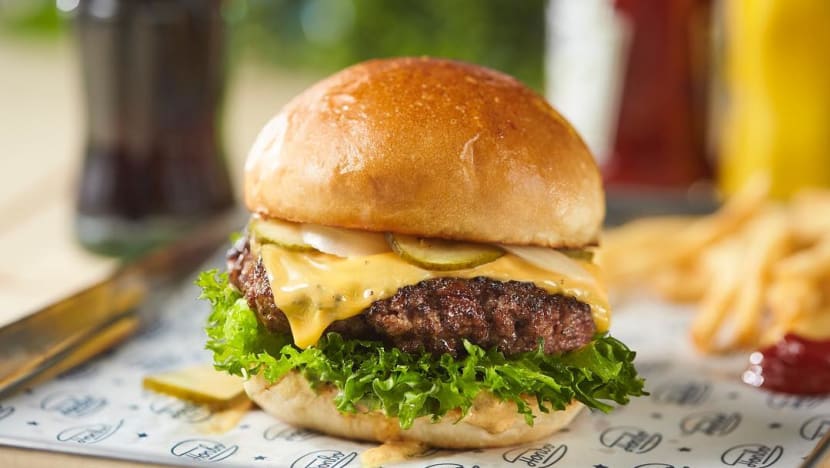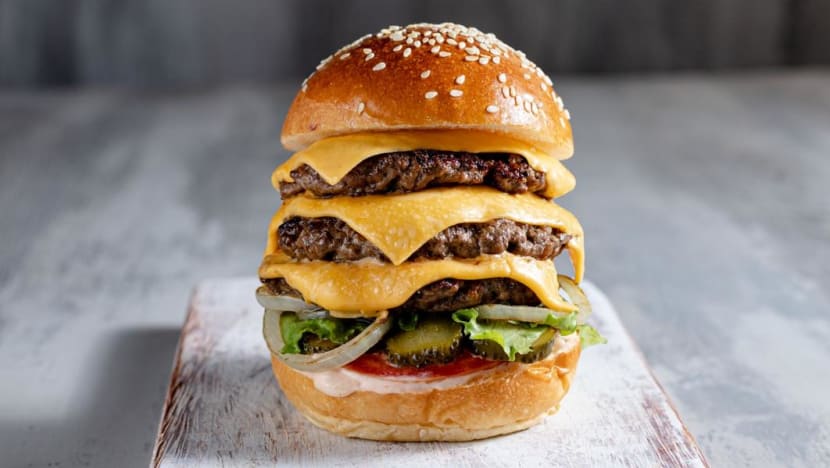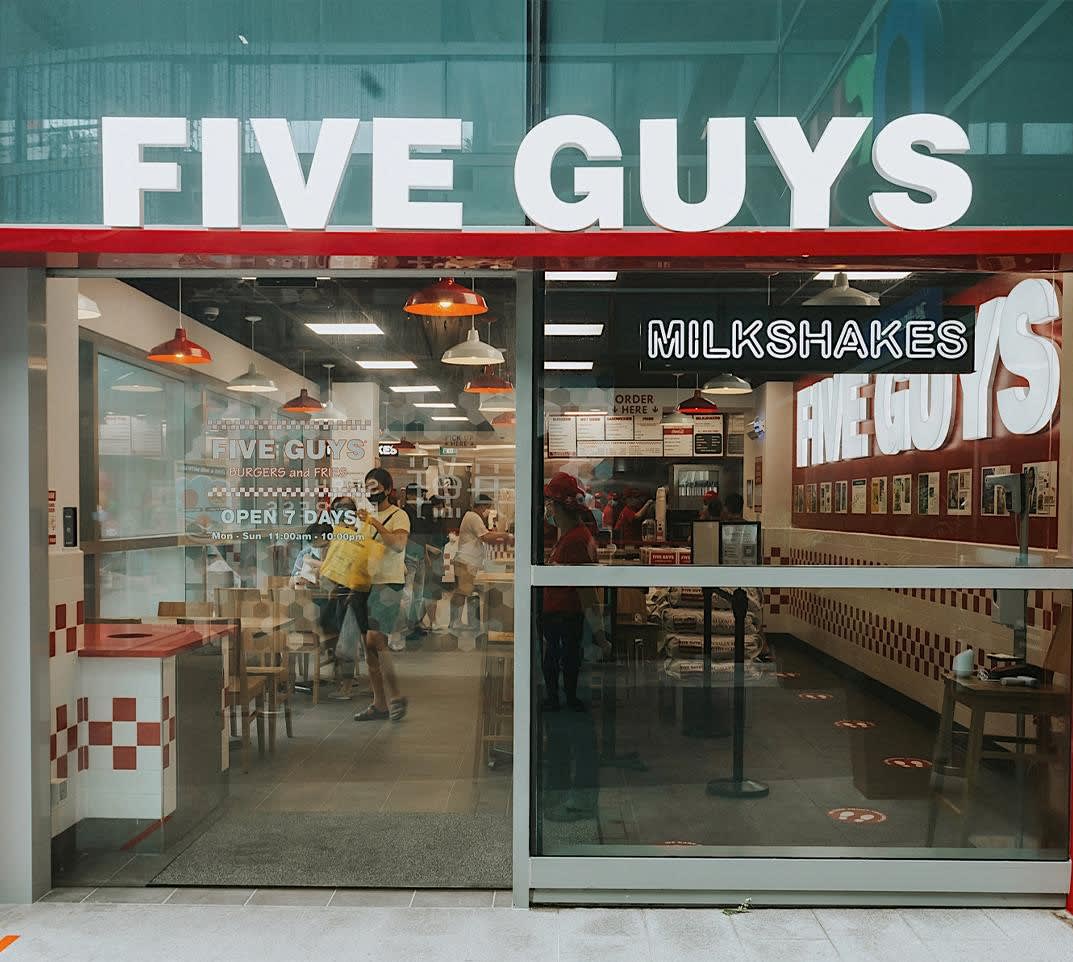'Who doesn't love a good burger': Is there still room for more burger chains in Singapore?
While the fast-food landscape in Singapore seems to be approaching saturation, the appetite for burger speciality stores remains strong, says an F&B expert.

Hong Kong burger joint Honbo opened its first Singapore outlet at Chijmes in July. (Photo: Facebook/Honbo.Burger)
SINGAPORE: From fast-food outlets to hawker centres, burger joints can be found in almost every corner of Singapore.
Over the years, several international burger chains such as Shake Shack and Five Guys have made their way to Singapore. The most recent entrant is Hong Kong's Honbo, which specialises in gourmet American-style smashed burgers and opened its first Singapore outlet at Chijmes in July.
But both F&B experts and burger chains agreed that while Singapore's burger scene is crowded, it has not reached saturation quite yet.
“Of course there’s still room to expand here and get more market share. Who doesn’t love a good burger?” said Mr Mitchell Noble, owner of Noble Consulting, which specialises in F&B operations consultancy.
“We, like many other countries, are always looking for the latest brands and trends … So, no I don’t believe we are saturated yet. (There are) still some ways to go and it’s a constantly changing market.”
Mr William Leonard, F&B director of Zouk Singapore which manages the local operations of American burger chain Five Guys, told CNA that rather than being saturated – which he defines as “too much” – he considers the market to be “mature”, where there is a healthy amount of competition.
“If a brand can find an unmet need and sees a gap in the market for their particular style of burger – why not?”
Likewise, Mr Marcus Matic, founder of Phat Burger Bro, added that Singaporeans “truly enjoy a good ol’ fashion burger”.
“The more competition, the better. Perhaps it's part of my job, but I enjoy going to other burger establishments and trying their menus. Each burger outlet has their own burger styles, so it's fun to try other brands and see what works and what doesn't work,” he said.
“Whether it's a crafted burger bistro like ours or fast-food model, everyone loves comfort food that is made with quality.”

BURGER PLACES CLOSING
But an industry expert said that although Singapore's appetite for burgers remains strong, the market appears to be nearing a saturation point.
Newer operators like Shake Shack, Nothing But Cheeseburgers (NBCB), MOS Burger and Carl's Junior continue to compete with household names like McDonald's, KFC and Burger King, said Mr Karthik Bakthavathsalem from Nanyang Polytechnic.
“All of them face similar competition – to get consumers to choose them for their next meal, said Mr Karthik, the course manager for the polytechnic’s diploma in food and beverage business.
The COVID-19 pandemic also exacerbated the situation, with many outlets closing as they had few customers, and new brands cautious about expanding“given the many unknowns”.
In August, Fatburger closed all its outlets in Singapore after its operator Deelish Brands shut down.
The trend of international burger brands opening outlets in Singapore is not new and will likely continue, said Mr Benjamin Chan, chief strategist at Protegie, a marketing consultancy firm specialising in F&B.
“Singaporeans are a picky bunch of people. They generally look for value in these brands so if they overprice, they will usually exit within three years or there will be a change in hands of owners behind the scenes,” he said.
On whether Fatburger’s closure signals consolidation in the market, Mr Chan said the labour crunch and rising costs of rental, food, utilities and manpower have led to some companies exiting or closing selected brands.
The industry will “always move into a stable equilibrium” of having a few significant players and some new entrants, he added.
Nanyang Polytechnic’s Mr Karthik said that using the closure of a single brand as a metric for the entire market is an “oversimplification”.
While burger brands may face common challenges, those who close will have their own reasons, he said. Rental costs, recruitment difficulties, higher-than-expected remuneration packages, food supply and associated costs could all affect business sustainability in the long run.
“The ability to effectively plan, anticipate and manage these costs, while expertly navigating the changing business environment, will be critical to helping food businesses survive and thrive,” said Mr Karthik.
WHY BRANDS COME TO SINGAPORE
Despite the challenges, Singapore is a popular choice with international burger brands opening flagship stores in Asia, said Mr Mitchell from Noble Consulting.
“(The) ease at setting up is also a big plus – everything is quite straightforward here and clear – unlike some Asian countries,” he said.
Protegie’s Mr Chan also pointed to the population density and purchasing power of Singapore as reasons for its attractiveness.
“A lot of these big brands are brought in by bigger chains that own other existing F&B brands in Singapore ... the business owners feel there is a potential for sustainability to the business as a whole,” he added.
Singapore is also well known internationally as a melting pot of cultures, experiences and cuisines, said Mr Karthik of Nanyang Polytechnic.
“With our rich gastronomic tapestry that blends a thriving international culinary scene with a variety of regional dishes, we remain an attractive location for overseas fast-food establishments to branch into,” he said.
OPENING MORE OUTLETS
New establishments aside, existing brands such as Five Guys and Phat Burger Bro said they have plans to expand their business in Singapore.
Mr William, whose company manages Five Guys, told CNA that the burger chain plans to open three more outlets in Singapore between 2024 and 2026, on top of its existing three shops.
Phat Burger Bro, which has one store in Singapore now, plans to open another one to two outlets.
“We believe in keeping our operations smaller to maintain quality and consistency and expand organically versus rapid expansion,” the brand's founder Mr Marcus said.
Both brands said they consider several factors before opening a new outlet.
For Five Guys, Mr William said the company looks for locations with high foot traffic during lunch and dinner times at least five days a week.
These locations have to be in “more premium areas” given the burger chain’s price point, said Mr William, adding that “real estate is in short supply” for their concept.
The unit's size should also ideally be between 2,000 sq ft and 2,600 sq ft.
For Phat Burger Bro, it's all about the location. “We want to maintain the burger bistro concept – not fast food -- whereby we offer a casual, cool American vibe to enjoy our burgers and also a place to hang out with friends or families for a few craft beers,” said Mr Marcus, adding that finding the right operating partners will also help in expansion plans.

HAWKERS ON COMPETITION
Besides international franchises, fast-food places and bistros, there is another pool of players in the burger market – hawkers.
Two hawkers told CNA that the entry of international brands has been a cause of concern.
“When Shake Shack first landed in Singapore, to be honest we did discuss if that was going to affect our business. They’re an extremely good burger chain that does what they do really well,” said Mr Kelvin Hong, who runs the hawker stall Hammee's at Commonwealth Crescent Market and Food Centre.
However, he did not notice any dip in business and also not when other international chains opened, said Mr Hong.
Likewise, Ashes Burnnit, which has six hawker stalls around Singapore, said it was worrying at first when international burger brands started coming into Singapore.
When new brands come in, especially those that are popular in their countries of origin, people in Singapore will flock to them “just for the hype or to be a part of something new”, said chief executive officer Farhan Zainudin. As such, local businesses will have a small pinch in their revenue, he added.
“But the good news is that also as Singaporeans, we will not stray so far from our roots in terms of our food choice,” he said.
“Such international brands that come to Singapore will act as a phase for Singaporeans to have another alternative to their dining occasion but I doubt that these establishments can ever replace the heritage of the Singapore food scene. We will still go back to our cheap local food as our daily staple meal.”
On standing out amid competition, Mr Hong pointed out that Hammee’s abilities are “more limited” as a small business and that it does not have a big budget for marketing.
“We still believe that good food will sell itself, and so we devote most of our energy to making the burgers as good as they can be. Hopefully if our customers enjoy the food, they’ll tell more people about us,” he said.
At Ashes Burnnit, the business model is to make the “best food” for customers without them having to pay high prices for it.
“We want to be able to convert the mindset of Singaporeans that Western cuisine need not be expensive and need not go to cafes or restaurants to be able to enjoy them,” he said. Instead, they can find those cuisines “in the comfort of their own neighbourhood”.
















